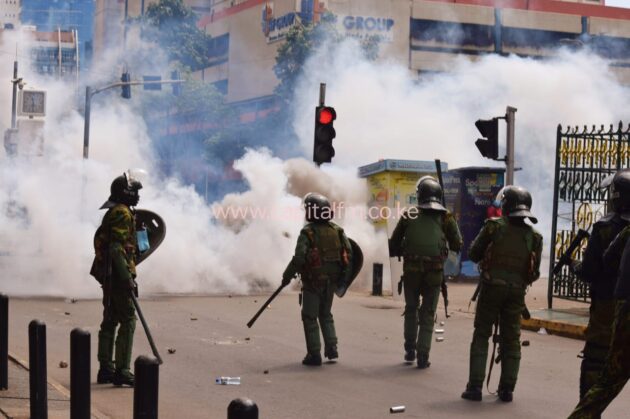
How Gen Z Literally #Occupied Parliament » Capital News
NAIROBI, Kenya, June 25 – When Generation Z dubbed their demonstration as #OccupyParliament, many did not anticipate the literal occupation of Parliament precincts, one of the most protected zones in the country.
The youth, demonstrating against the Finance Bill 2024, managed to breach security and gain entry into the bicameral house, leading to chaotic and unprecedented scenes.
At least four protesters were shot dead as police struggled to disperse rioters who had stormed Parliament following the passage of the controversial Finance Bill.
Several others sustained serious bullet wounds during the violent confrontations. “I have seen four bodies of the protesters who were shot dead,” a witness reported. “They are lying in a pool of blood outside Parliament.”
Protesters Storm Parliament
The demonstrators, initially gathered along City Hall Way, charged towards Parliament Road, raising concerns about how they managed to overpower the police and gain access to the highly secured area. Within minutes, the youth breached the exterior gate adjacent to the Jomo Kenyatta Mausoleum and divided into groups, wreaking havoc inside Parliament.
Vandalism and Chaos
One group targeted the Senate Chambers, causing widespread damage by shattering windows, destroying furniture, and removing decorative fixtures. Although they attempted to gain access to the house, the locked doors thwarted their efforts.
Another group managed to enter the National Assembly Chambers, which were open at the time. “Mr. Speaker Sir, I am here to address you. You must go, Ruto must go, we are here, and we are going nowhere. We are actually going to sleep here. We don’t fear you guys, you are hypocrites,” one protester shouted from the Speaker’s seat.
Dining Area Raided
A third group raided the dining area, helping themselves to the arranged buffet for MPs who had just exited the chambers after passing the Finance Bill 2024. The demonstrators, lacking cutlery, ate with their hands as parliamentary staff fled for safety. “We don’t fear you, we will eat because these are our taxes. We told you we would be here no matter what,” one protester was heard shouting.
Fires and Destruction
The situation escalated further as protesters vandalized windows and set fire to the new wing of the Parliament building, causing significant damage. MPs and parliamentary staff scrambled for safety, questioning how the demonstrators managed to breach such a secure zone.
Violent Clashes with Police
Thousands of protesters engaged in running battles with the police, who fired rubber bullets and tear gas to disperse the crowds. Similar chaos erupted in major towns, including Nakuru, Mombasa, Eldoret, and Nyeri. Businesses were shut, and transport was paralyzed as police clashed with demonstrators calling for MPs to reject the proposed tax increases.
Our crew covering the youth-led protests counted more than 10 people being rushed to hospitals by ambulances, while others remained on the ground, writhing in pain. “People have been shot, it is very bad,” one protester yelled while fleeing from a thick cloud of tear gas.
International Attention and Legal Concerns
The protests attracted international attention, with support from Ugandan opposition leader Bobi Wine and South Africa’s Julius Malema. Even former President Barack Obama’s sister, Auma, was teargassed during her participation in the protests, which were broadcast live on television.
Lawyers and human rights groups have expressed concern over the use of live ammunition to quell the riots and reports of arbitrary arrests and intimidation of activists. Reports emerged of at least five prominent social media users, including Gabriel Oguda, being abducted at dawn hours before the demonstrations.
Government Response
The government has defended the taxes as necessary to raise additional revenue to reduce Kenya’s debt. However, in response to public outcry, it scrapped some contentious taxes, including those on bread, cooking oil, and motor vehicle ownership. Despite this, protesters have demanded the complete withdrawal of the bill.
Despite ongoing protests, a majority of MPs passed the controversial bill during its second reading. On Tuesday, they debated various amendments to remove some contentious clauses. At least two people died, and hundreds were injured in last week’s largely peaceful demonstrations. President William Ruto acknowledged the protests and promised to hold talks to address the concerns of the youth leading the demonstrations.
